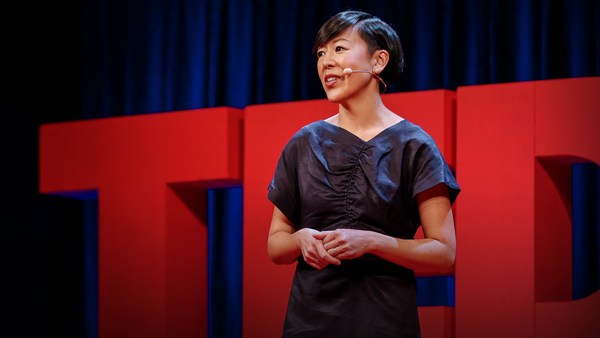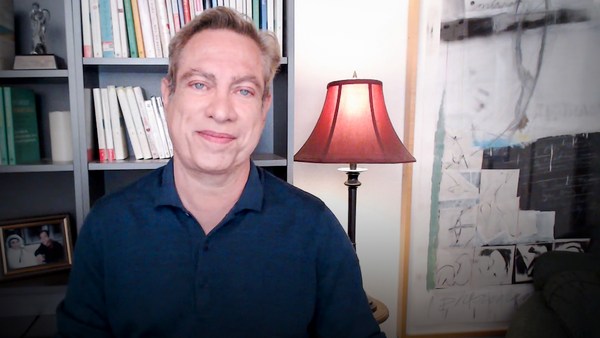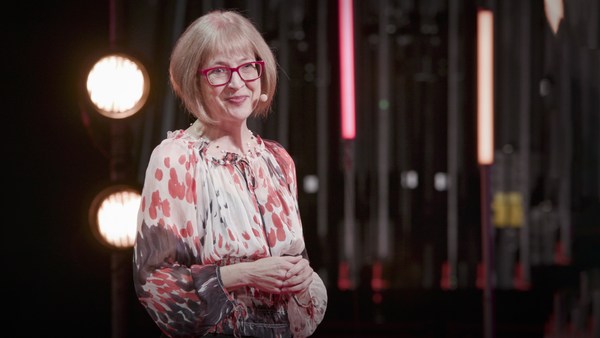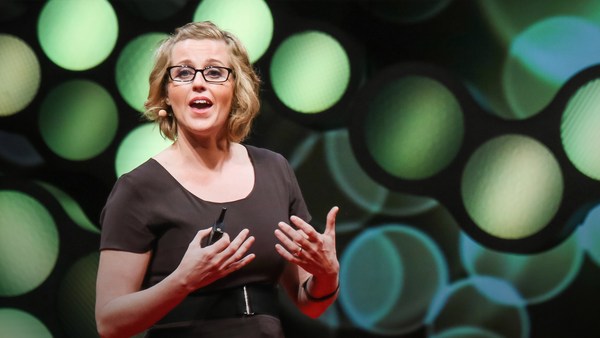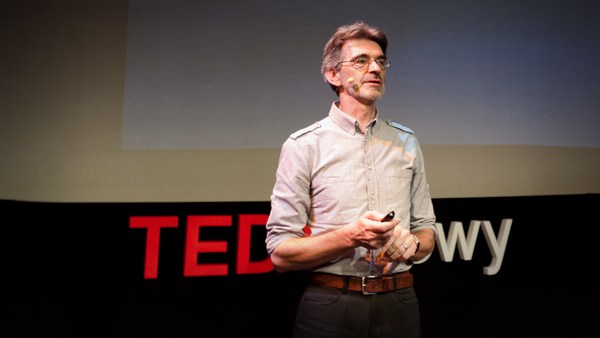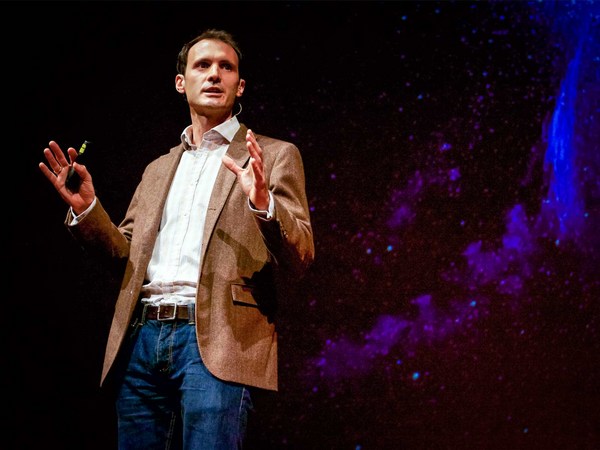I want to die at sunset. I want to watch the sky change and turn orange and pink and purple as day dies into night. I want to hear the wind fluttering through the leaves and smell very faintly, nag champa amber incense, but very faintly, because scent can be tough on a dying body. I want to die with socks on my feet because I get cold. And if I die with a bra on, I'm coming to haunt everybody.
(Laughter)
I will terrorize you and that is a threat, OK?
I want to die in my own bed, at my own home, with my loved ones nearby who are talking amongst themselves and comforting each other for this very big thing that's about to happen in their lives. I want to die with all my affairs in order so my loved ones have nothing to worry about but their grief after I die. I want to die empty, devoid of all of the skill, gift, talent and light that I carry in this body and satiated, full of the richness of this one unique human ride. And when my loved ones notice that I have released my last breath, I want them to clap. I want them to clap because I died well, but I died well only because I lived well.
Now, will it happen this way? Probably not. Realistically, I mean, even with all this rah-rah death talk I talk, I'm probably going to go kicking and screaming.
(Laughter)
Unless we choose, the date, place, manner and time of our death will remain a mystery. Then why think about it at all? Death creates context for our lives. My entire life is leading up until that point. How we die creates the period at the end of the sentence, but it is the period that makes it a sentence at all.
Imagine for a moment your 847th birthday. OK, try. I mean, you're probably pushing 30, 40, 50, 60, 70 in this room. Imagine 847 of them. So you’re sitting there and your body is raggedy. Because unless they cure aging, I promise you, you do not want to be immortal. I promise, you're going to be begging for death. So it's your 847th birthday. Here they come with a cake. No candles on it, because it would burn the house down. And now here they come, singing that same tired song. "Happy birthday to you," you would be so over it. And if it was a Stevie Wonder version, that song is already 45 minutes long, you'd be extra over it.
(Laughter)
Nobody wants that. We count birthdays now because they're finite. They're special. They mark the passage of time, and one day, we won't have any more time. And I find that to be a really useful fact. I think it's healthy for us to think about our death.
And you might say, of course I do, because I'm a death doula. I wanted us to embrace thinking about our mortality. I spend a lot of time thinking about, talking about, helping people prepare and teaching death doulas. Death doulas offer non-medical and holistic care for the dying person, the circle of support and the community through the process.
I want to acknowledge first what a privilege it is for people to be able to know about and afford and hire a death doula. We're working on it. And next, what a privilege it is for me to even be able to imagine my own death. It says that I have a sense of safety. My basic bodily needs are met. And I have safety in my body, my mind and in my life, even despite the skin I wear.
That wasn't always the case. I came to this work by serendipity, by circumstance, but mostly by necessity. A little over ten years ago, I was practicing law at the Legal Aid Foundation of Los Angeles, and I grew depressed. Not like, "Oh my God, I'm so depressed," but like, for real depressed, like, "can't get out of bed" depressed, "can't shower" depressed, can't find hope, "can find a smile, but can't really find joy," type of depressed. I took a medical leave of absence, so I went to Cuba, and I met a woman there, a fellow traveler on the bus, who had uterine cancer. We spent the 14-hour bus ride talking about her life and also her death. And it was a highly illuminating conversation. I heard firsthand how hard it was for her to even be able to talk about her fears around mortality and her disease because people censored their own discomfort with mortality rather than make space for her. I took the invitation, however, to think about my mortality and looked at my life from the perspective of my death for the very first time. And it was grim, I did not like what I saw. I noticed then that I had to live life on my own terms because I was the only one who was going to have to contend with all the choices that I'd made at my death.
Not long after I came back from Cuba, my brother-in-law, Peter Saint John, became ill. And not too long after that, they couldn't cure him anymore. So I went to New York, where he and my sister and my niece were, and along with Peter's family and my family and his friends, we ushered him to the end of his life.
Being present for Peter's death is one of the greatest gifts I've ever been given. Not only did I get to care for somebody who I loved so dearly, but it also grew my capacity for compassion. I knew, intellectually, that there were thousands of other people that were walking through the same thing at the same time. And it also hinted at the things that I've been talking about in Cuba. Everybody was uncomfortable with the fact that he was going to die, even the medical care team. I knew that there should be somebody, somebody who was there, somebody who could be with us to walk alongside us. Somebody who could listen to us, offer resources, hold our hands, hold our hearts, bear witness to our pain, help us sort through information, tell us that we were doing the best that we could with the worst that we were dealt. But I couldn't find anybody. So I became that someone for other people.
I sit deep in the trench with folks as they prepare for death. There's no fixing or saving anything because there's no fixing or saving grief or death. It just is, I meet people where they are at. My goal is to help them answer the question: "What must I do to be at peace with myself so that I may live presently and die gracefully, holding both at the same time?"
When I'm thinking about my present life from the vantage point of my graceful death, I can see very clearly who I want to be, how I want to spend my time and what of me I'll leave behind. It allows me to consciously curate my life right now and also figure out my little "whys" right now. Because what are we waiting for, anyway? Like, death?
I used to think dying people had it all figured out, though. I used to think that they'd lay there with their hands like this because we all know this is like, universal dying person pose. So they'd lay there with their hands like this, and there'd be a little glimmer in their eye, they'd be like, "Oh, yes, finally, it all makes sense." Turns out it's not like that at all, it doesn't look like that. Hollywood has lied to us, we know that already. Cinderella was unconscionable, but this is just flagrant. It's not like that at all. It's way too much work to be doing while you're dying. So it doesn't look like that, there's no secret, there's nothing magically you'll find out then. This is it, there's nothing to figure out, no big secret at all. Many of my clients also reached the end of their lives wishing that they had more time. But I'm always curious, more time for what? What else would they do with the time that they had? It's rarely to go see Machu Picchu, OK, I'll tell you that.
Can I tell you a story? OK, so this client is a composite, very many clients shoved together because as juicy as their stories are, it's not my responsibility or job to tell them. So this is many clients together, and I find that it's an easy composite to make because it's universally applicable. This applies whether or not somebody has worked their entire life or sits on a big trust fund or works three jobs to keep the lights on. You might find bits of yourself in this story. This client is somebody who had a decent amount of privilege, but not without adversity, of course, because she's human. She had a great job, great career, had been a real trailblazer. Kids who she loved, who she was proud of, good friends, traveled a bunch, did a bunch of great things in her life, had plenty of romance and love. She was doing OK. The girl who had everything.
And then came a plot twist. That plot twist was an aggressive bone cancer that was likely going to kill her. And with that plot twist came a sense of pointlessness to her life. She couldn’t figure out what she’d been doing for the past 60-odd years because she'd been so busy doing. While she was healthy, it was about the next career milestone or what's happening with the kids next or the next trip. When she was sick, more of the same. Next doctor's appointment, next scan, next medication. She was so busy distracting herself from like, the difficulty that she found in her life, staying out of her body so that she didn't have to be present with what was going on. It was always out there, she was always looking out there. But death was coming to remind her that she had no more "out theres." That it was always only right here, where there is nothing at all to do but simply to be.
We zoomed out on her life to look at what she enjoyed, to see where she placed value, because from there we can figure out where we place meaning. And it turns out it wasn't about the kids or the work or the money. It was about the little things. Her hands in the soil. Her garden. Building a fire, reading books and food. She loved to eat, but she had dieted most of her adult life. The sound at all familiar to anybody? OK, if it does, this is for you, OK? If you take nothing away, hear this: you are going to die, so please eat the cake. Eat the cake, order the dessert, eat the french fries, eat the brownies. Eat everything you want to, just eat it, because you're going to die. One day, you won't be able to anymore.
At this point in her disease process, chemotherapy had ravaged her taste buds, so she had to rely on her sense of smell to get pleasure out of eating. And she ate. She did it as much as she could because she knew she wouldn't be able to for much longer. She ate as much as cancer would allow, and when her body could no longer process food, we placed her favorite passion fruit soufflé right on her lip, and she would lick it and smile. She lived more in the last eight months or so of her life with the help of hospice than she had before. She was finally present, at home in her body, delighting in the richness of the sensory experience we have by virtue of these fantastical bodies that we will die in. These bodies that we will die in.
She was also really curious about her legacy. What, if anything, she'd leave behind. But leaving a legacy isn't optional. We're doing it every single day. You're doing it with every smile, every word, every kind word, every harsh word, every action, every inaction, every dollar you spend. You're telling the people who are paying attention exactly who you are, and that is what they'll tell of you when you are gone. At her funeral, despite all of her career accomplishments, nobody talked about any of that. They talked about who she was, nobody cared about what she'd done. When we focus on our productivity, we highlight what we have to do to feel worthy, rather than who we get to be, where worthiness is our birthright and we are human.
(Applause)
We're human. Messily, magically, fantastically, beautifully, briefly, perfectly human. Now humans are meaning-making machines. We can make a story out of anything and make it sound good. So why not then make meaning out of the magic of the mundane? And absolve ourselves of the responsibility of trying to have some grand life purpose? Why not just give ourselves permission to be fully human, to be fallible, to be messy, to be here while we're here? I mean, is nobody else tripping out over the fact that we're on a giant blue rock spinning through space? Y'all don't trip about that, because I do regularly.
(Laughter)
And then what really trips me out is that while that's going on, we're getting bent out of shape over traffic. Please let the cars merge, OK? Can we agree universally we're going to let people merge? Let them merge, let them merge. Let them merge. It requires nothing of you, just to give them a little bit of time. And in fact, it's probably taking more time off your life by all the high blood pressure when you don't want to let them merge. Just let them in, it'll be fine, everybody's fine, it's OK. Hold life lightly. We've got to hold life really, really lightly. We are all dying. We're all dying.
Now I can understand why people maybe don't want to talk about death or think about it. It's uncomfortable. It's sad, it's scary, icky. Acknowledging your death means that you are not the center of the story, and that is disquieting to the very fragile human ego. Acknowledging your mortality also means acknowledging our powerlessness and lack of control we have in life. Also icky. It also means surrendering to the big "I don't knows" of life and also the really big "I don't knows" of "what, if anything, happens after we die?" But since we don't know, why not imagine something absurd, something glorious, something huge? A vision that actually serves you rather than makes you want to recoil in fear. We could.
You want to hear my working theory? It's absurd, OK? And please remember, even though I might kind of look like Miss Cleo, I don't know anything about what happens after we die, alright? This is just an idea, OK. So I'm on my deathbed. On the outside, they are clapping. On the inside -- well, I've hit my death pose, all right? I'm in my death pose. On the inside, I'm starting to feel everything I ever felt in this body, all at the same time. It's all starting to gather up in my body all at the same time. Like that one time I was 11 and I stepped on a frog. I mean, poor frog, and I felt so bad, but I was barefoot, ew, like, I can still feel it squishing up between my toes. Yuck.
(Laughter)
When you bite into an orange and the juice squirts into your mouth, and then there's the little bite in your jaw, there's a little bite in your jaw because it's sour. Or when you first bite into a fried plantain. Or getting into clean sheets, that feeling gathering in my body, all the feelings, getting into a hot shower, listening to a song that you love for the very first time, I'm hearing Stevie Wonder "As" playing, how I feel my spirit when I see the color yellow. Just all these feelings are starting to roll up in my body. My niece’s laughter, my nephew trying to teach me how to Dougie. It did not go well. It didn't go well, I still don't know how to do it. How I can look into my partner's eyes and just by looking into his eyes, I can feel love in my body. All these feelings are starting to gather up in my body.
At the same time, I'm also feeling every little bit of pain I've ever felt physically and emotionally. I'm feeling all the sensations, I'm feeling anger, feeling rage, feeling frustration, feeling grief, feeling sadness, feeling all those things gathering up in my body. I'm feeling despair, desperation, sadness. I'm feeling insecurity. All the crippling doubt, I'm feeling all the failures, all the disappointments. Every single time I thought I couldn't make it through the day, It's all starting to gather up in my body. I'm also remembering every single time I did get up. So I'm also feeling all the hope, all the joy, all the awe, all the mystery, all the freedom that I feel in this body.
But most of all, I'm also feeling all of the love, all the aching love that underwrites it all. And when I cannot take it anymore, I am saturated with this experience that I've had, poof, I explode into a cosmic orgasm.
Audience: Yes!
AA: Yes. And like a pinata that's broken open, pieces of glitter start to fall from the sky. Glitter confetti, falling, falling. Orange, pink, purple, yellow, turquoise, everything. Gold, silver, falling, falling, falling, like a really soft snow shower. Falling everywhere. In larger concentrations on the people who loved me. And in lesser concentration on those people whose lives I touched. And then the rest of it just gets reabsorbed into a big undulating glitter wave that goes on all around as far as I can see, for all of eternity that envelops and encompasses us all. Maybe it's just glitter. Could it be? It could be anything. All I know is at that point, all I believe is at that point, when the glitter, all the pieces of me have been reencompassed, the I that I think of myself as, Alua Adwoba Arthur, having this one single solitary human experience, has been reenveloped into all that ever was and all that ever will be, And it is complete. And I am safe.
I am still far from where I was in Cuba. At that point, my death would have come as a relief. An ending to my pain and to my suffering and a way out of this life that I couldn't quite figure out how to get into. If I'm to die today, I know that my death will come as a celebration. As a culmination of a life lived in and loved. A life that's worth dying from.
After the last decade spent supporting people as they think through their lives and prepare for their death, I know, I trust that the real gift in being with our mortality is the sheer wonder that we live at all.
That's all I got. Thank you.
(Cheers and applause)
